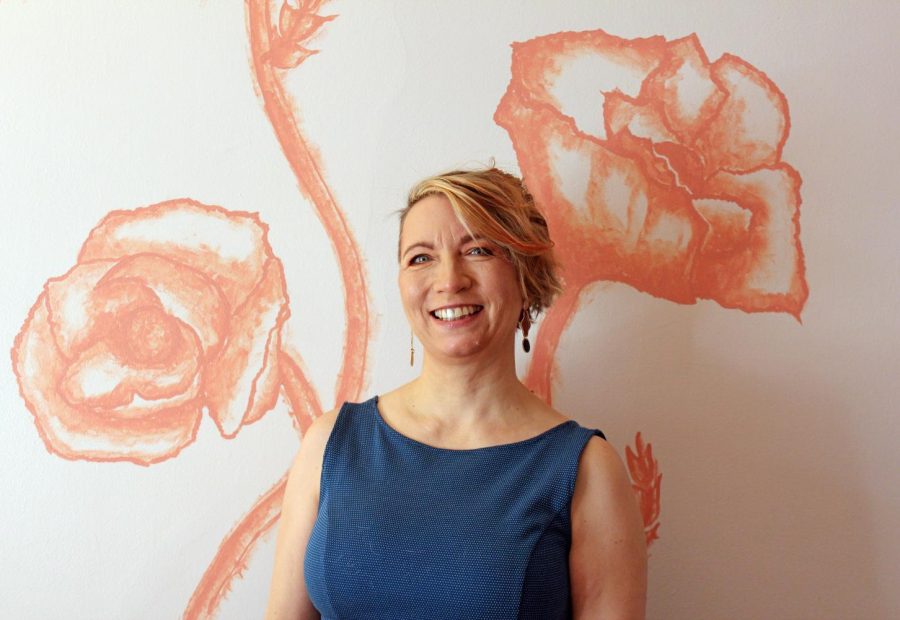‘Want you to succeed’: Pitt’s SBDC helps women-owned businesses
Image courtesy of Helen Campbell
Helen Campbell, CEO and co-founder of Stories Like Me.
January 30, 2022
Following a difficult season for her sustainable landscaping business, Judy Foster thought the doors to her business would close for good. But after one final attempt, and with the help of Pitt’s Small Business Development Center, Foster’s woman-owned business found revitalized success.
“We were really struggling in 2017, and there were a lot of things that I didn’t even understand or wasn’t aware of about running a business until I met with the SBDC,” Foster said. “They have a lot to offer, and they want you to succeed.”
Pitt founded the center, which is part of the Institute for Entrepreneurial Excellence, in 1979 as a no-cost service to clients working to build their small businesses. The U.S. Small Business Administration named the SBDC as the 2020 Excellence and Innovation Award winner, out of more than 1,000 similar centers across the nation. The SBDC completed more than 7,500 hours of business consulting in 2019, and provided 6,036 hours of counseling to women business owners in the last fiscal year.
Foster, the president of TerraGreen, started her company as a way to apply her sustainable landscaping principles on a larger scale, such as using native plants, limiting chemical use and building green roofs and rain gardens. Foster said she was looking to “embrace the challenges” of starting and running her own company, and to introduce people to the relatively new concept of sustainable landscaping.
“When we started, sustainable landscaping was very rare and a lot of people didn’t know about it or even think of landscaping as sustainable,” Foster said. “Over the last few years the concept has grown pretty quickly, and now about 80% of our clients reach out to us because we are sustainable.”
Foster said the knowledge she gained through SBDC was instrumental in running her business, especially when it came to the technicalities of operating a business. She said despite not having a business degree, the center has given her confidence and understanding in that arena.
“The tried and true formula for working in business is hard work, long hours and a quality product,” Foster said. “Fortunately, we were able to draw on the resources available at Pitt’s SBDC in order to do so.”
Meghan Hillegas, an SBDC management consultant, said the center works with anyone looking to either venture into a small business or receive support for their established business — and women make up a substantial portion of their client base.
“Our goal is to connect the dots for business owners and make sure they are familiar with what is available to them as a business owner,” Hillegas said. “Women make up, consistently, at least 50% or more of our client base year after year.”
Hillegas said the center tailors its services to the individual’s specific needs, instead of trying to use a one-size-fits-all approach. She said the needs of business owners will vary from person to person, and SBDC devotes its attention to meeting those individual needs.
“I work with a lot of women-owned businesses that operate in a predominantly male field, but there aren’t any stereotypicals conversations,” Hillegas said. “Our goal is simply to support the entrepreneur who sees a gap in the market, has a plan to fill that gap, and who is seeking assistance along the way.”
Helen Campbell, CEO and co-founder of Stories Like Me, saw a gap in the market of literature after attending a training session for the national education nonprofit she worked for at the time. Campbell combined her love for books with her interest in topics of diversity, equity and inclusion to found her small business online bookstore, Stories Like Me, with the help of her two daughters.
“Our mission is that every child should be able to see themselves in a story,” Campbell said. “Our goal is to build empathy, and through that to enhance kindness in the world and make it better.”
Campbell registered her business as an LLC in 2018, but her plans moved to the backburner as she dealt with a series of changes in her life. After moving to Pittsburgh in spring 2020, Campbell decided to give the business another try, enlisting the help of SBDC in her journey.
“The SBDC has done a lot of technical work for the business, such as a breakeven analysis and three-year projections,” Campbell said. “They have supported me in building my business plan, connected me with other experts in the area. Now, I have a great team to rely on.”
Hillegas said the center continues to work with its clients even after the business is off the ground — providing the services they need, adhering to their schedule and connecting them to external resources. She said the center has no limit on the number of clients it works with, nor a time frame in which clients must achieve their plan.
“We want to support as many small businesses as possible and we are constantly looking to connect with more resources in the area,” Hillegas said. “As long as there is progress being made, all I ask of my clients is to work towards next steps.”
Campbell said her next steps include securing a loan so she can move the business into a physical space. She said her top priority when searching for locations is the ability to make the building accessible to everyone.
“I turned down so many nice retail places because they wouldn’t or couldn’t make them accessible,” Campbell said. “I’m in the process of working on another, working on closing the deal and securing funding, with the hopes of opening in June.”
Foster said she plans to stay in contact with SBDC in order to continue her professional and personal growth in business. She said learning from others and being open to adapting and growing is one of the most important aspects of running a business.
“Things change all the time and you have to stay up with the new ways, you have to grow and continually learn in order to be successful,” Foster said. “My biggest piece of advice would be to learn from experts on how to succeed.”
Campbell said her business will continue selling books through its website and doing pop-up shops around the City. Campbell said the most influential change she experienced was when she started measuring success in terms of the connections she made, rather than by solely monetary standards.
“Yes, I have my breakeven and all those things that have to work for the business to flourish, but there are other measures of success,” Campbell said. “Look at how you define success, and be willing for something better to happen than you would imagine.”



